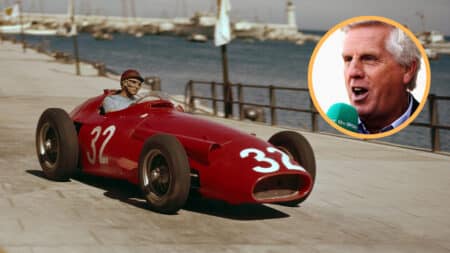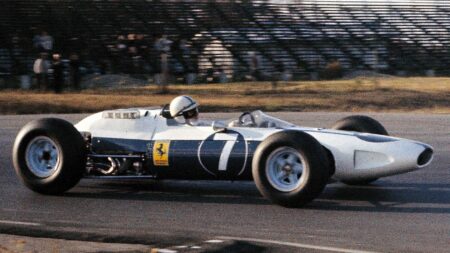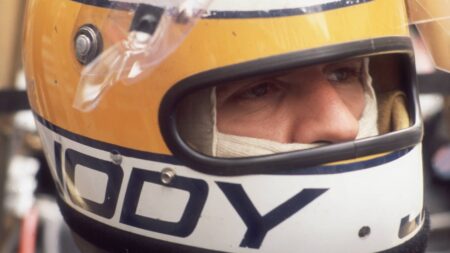
Denis Jenkinson's Porsche 356 roars again at Goodwood
Six decades after Motor Sport's famous continental correspondent Denis Jenkinson ran his Porsche 356 across Europe, it's now racing again following a long and careful restoration
 Ideas for Motor Sport stories can spring from anywhere, and in my experience the best ones often come when you least expect them, totally out of the blue. Or in the case of the November issue, I should say totally out of the pink! Allow me to explain.
Ideas for Motor Sport stories can spring from anywhere, and in my experience the best ones often come when you least expect them, totally out of the blue. Or in the case of the November issue, I should say totally out of the pink! Allow me to explain.
I was reading a great book earlier this year about the Le Mans 24 Hours in the 1970s. The task was officially work because I was planning to review it for the magazine, but as work goes it was hardly a chore. Delving into one of my favourite subjects, guided by the words of Quentin Spurring – one of the finest racing journalists and editors there has ever been – was somewhat more appealing than the pile of mind-numbing paperwork I was doing my best to ignore.
I’d got to the chapter on 1971, exactly 40 years ago, of course, and the final Le Mans in which Porsche’s glorious 917 would rule – before the pesky regulators pulled the rug and abruptly ended a fantastic era of sports car racing. I turned the page and there it was: the ‘Pink Pig’. I smiled. What a beautifully ugly racing car, and what a livery, I thought. That would look great on the cover of Motor Sport…
Imagine the same thing happening today: a manufacturer commissions a specialist aerodynamics company to refine its already pace-setting prototype. The result, no matter how potent, is so reviled by the team sponsor it refuses to allow its colours anywhere near the car. So the cheeky engineers and mechanics come up with their own porcine-inspired paint job, literally butchering the design in the process…
The ‘joke’ goes all the way to the world’s greatest motor race, and not only that, the car even proves to be competitive. Add to that an unresolved 40-year argument about what caused it to crash out during the night and you have the bare bones of a great cameo story revolving around one of the greatest racing cars we’ve ever seen.
Duly inspired (thanks Q), I contacted the ever-helpful people at the Porsche museum in Stuttgart and organised a photo shoot. Photographer Matt Howell and art editor Damon Cogman took on the enviable mission to capture Porsche’s porkiest ‘Porker’, while Rob Widdows tackled the words. The man who crashed the Pink Pig was one Reinhold Joest, who would of course enjoy greater success as a team owner in later years. Rob caught up with him at the Silverstone 1000Kms and briefly diverted him from Audi’s 2011 campaign to track back to his days when he was ‘in the pink’ (or to be more accurate, salmon – as Matt and Damon would discover, the car isn’t even truly the colour it’s supposed to be!).
Racing cameos are so often more fascinating than the A-list stories, and we have two more in the November issue. Andrew Frankel has increased his already-impressive roster of significant racing cars he has driven by two this month. I know, I’m jealous too. After Can-Am McLarens and Lolas last month, it’s Porsche Grand Prix cars and 1980s Le Mans ‘street’ cars this time. His dual tales of unfulfilled promise are the perfect side dish to the ‘Pink Pig’ main course.
Porsche history was in mind, too, when I asked veteran journalist Mike Cotton to revisit the life and career of Jo Siffert, a man he knew well. The Swiss master of the 917 died 40 years ago this month in an inconsequential non-championship F1 race at Brands Hatch – and ‘Seppi’s’ story is yet another reminder of how one aspect of motor racing has definitely changed for the better these past four decades.
Tragedy also shades our story from 50 years ago, as we revisit the year of the ‘Sharknose’ Ferraris and Wolfgang von Trips, the man who should have been Germany’s first World Champion – long before Michael Schumacher and Sebastian Vettel. Opportunities to hear from first-hand sources from so long ago don’t come up every day, and when Anthony Pritchard approached me to say he could interview Ferrari’s great sporting director Romolo Tavoni I didn’t need much convincing. Tavoni’s memories of Ferrari’s dominant season, its tragic finale and his own traumatic exit from the team are as sharp now as they ever were. It’s a fascinating insight into life at Ferrari under the Old Man.
And what of Nigel Roebuck this month? Well, as usual his eight-page Reflections column is essential reading as he ruminates on Spa and Monza, both in F1 today and way back when. But there is something extra special for UK readers and subscribers this month: a free supplement written by Nigel about all 32 F1 World Champions.
From Farina to Vettel, our supplement offers a fascinating snapshot of each champion since 1950 – and because it’s written by our eminent editor-in-chief their achievements are put into perfect perspective.
Vettel is nearing another career landmark, joining the ranks of the back-to-back champions alongside Ascari, Fangio, Brabham, Prost, Senna, Schumacher, Häkkinen and Alonso. In the wake of the Singapore GP, he needs just a single point to add that second title – all at the tender age of 24. We’re beginning to wonder: if we reproduce this supplement in 10 years’ time, how many titles will Sebastian have against his name?
We always thought (and hoped) Schumacher’s record of seven would stand forever. At Vettel’s current rate, that opinion might need some revision.

Six decades after Motor Sport's famous continental correspondent Denis Jenkinson ran his Porsche 356 across Europe, it's now racing again following a long and careful restoration

Voice of 90’s motor racing is completing project to revive hidden gems of motor sport film and television.

Ferrari's F1 car is set to feature a 'blue livery' at the 2024 Miami GP – we look back on the other times Maranello cars haven't run in red

Think of the great Formula 1 champions and Jody Scheckter is unlikely to feature. But, writes Matt Bishop, the 1979 title-winner deserves more acclaim for a career in which he was once the best driver, bar none